10th ITB Hospitality Day 2015: The Sharing Economy wave making everyone sweat
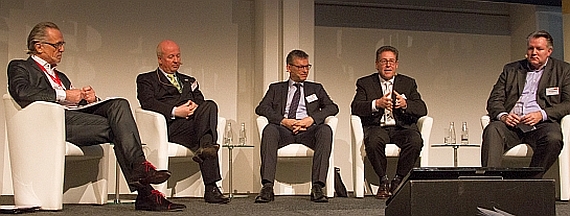 |
| Searching for a positive approach: (from left) moderator Hans-Juergen Klesse, Marcus Bernhardt of Europcar, Robert Wissmath of Dicon, Michael Hartmann of EHL, and Marco Nussbaum of prizeotel. |
Berlin (April 10, 2015). Those who are looking for the fairy tale of selfless sharing will not find it in the Sharing Economy. On the contrary. A new branch of industry that makes use of missing resources and of missed developments within individual industries has sprung up before our eyes. "The Sharing Economy creates no better capitalism," believes Robert Wissmath, Managing Director DICON Marketing and Consulting Company, "but rather, it extends the present economic processes." It did not take long for Airbnb, the signboard for the Sharing Economy and great scapegoat of the hotel industry, to be the subject. The discussion of the "Sharing Economy" subject during the 10th "ITB Hospitality Day" at ITB Berlin at the beginning of March demonstrated that the hotel industry is now on the path toward loosening its opposition and thinking more strongly about synergies or even cooperations with sharing suppliers.
The company has a market value of 10 billion USD and generated a revenue of 250 million USD last year. Likewise last year, Airbnb counted ten million overnight stays in 192 countries. Marco Nussbaum, Chief Enabling Officer of the prizeotel budget chain soberly reflected that in a relatively short timespan, the start-up will likely offer more beds than IHG (InterContinental Hotels Group) and Hilton – without owning or managing one single hotel. And sent a reminder in view of the protest from the hotel industry: It is not at all about the destruction of old commercial models – but about market shares.
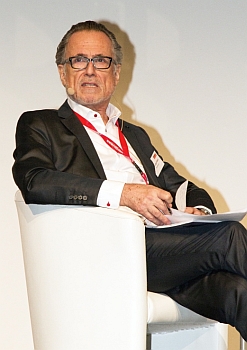 |
|
| Journalist Hans-Juergen Klesse insisted on commitments. |
What the new branch of industry that is based on sharing makes especially clear to the established industries, however, is the loss of contact with the customer and with this, the feeling for the customer. "Out of touch" has been said there. "The Sharing Economy is an expression of that which the customers want. Either one struggles against it or one goes along with it," said Marcus Bernhardt, ex-hotelier and today the Chief Commercial Officer with Europcar car rental company.
Above all, the Millennials have grown up in a sharing and assessment culture and expect other hotel offers and services. These are the delayed reforms from which industries such as the hotel industry suffer, confirms Nussbaum. Everything that has to do with the Internet has been considered as a tiresome, obligatory activity for too long. The pressure came and then along with that, the experiments that had apparently originated from the companies' own handcrafting.
When it comes to the Sharing Economy, the concerns of the customers are low and it does indeed promise a more favourable and more authentic experience. Several studies that were directly presented during the ITB confirm: There is a good and growing acceptance of this form of travel. 17 percent of those questioned internationally by Travelzoo had already booked a private accommodation for their holiday once. Nearly everyone was satisfied. 50 percent are interested and 70 percent of the experienced vacationers rate them even better than a hotel accommodation.
Hotel industry must learn the unexpected
Michael Hartmann, Senior Executive Advisor of the Ecole Hôtelière de Lausanne (EHL) is facing the development very calmly: "Indeed, we already know of such private overnight suppliers and apartment boarding houses from the post-war period."
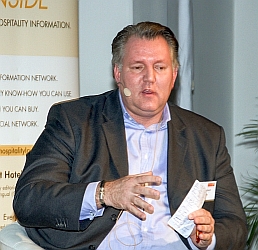 |
|
| Marco Nussbaum also critised the own industry. |
While these offers had initially disappeared with the professionalisation of the hotel industry, they have simply appeared again today and are utilising the modern tools. "The question is, at what point do we take the seniors pursuing a two bed operation, the holiday apartment supplementary income operator or the professional apartment sharer seriously as a competitor."
Current studies insist that the development be taken seriously. The Shared segment is growing with its use – virtually automatically – and the hotels are charged with doing more in terms of local tips and a closeness to the customer: "Sharing Economy fans want to get to know the renters, their culture and their personal recommendations for leisure activities and restaurants in the surrounding area," said Prof. Dr. Roland Conrady of the University of Applied Sciences Worms that had introduced its own study (see link) during ITB. And according to it, a prepared breakfast or a full fridge, among other things, are "subordinate for the majority".
Michael Hartmann, Senior Executive Advisor, Ecole Hôtelière de Lausanne confessed: "A Service Surprise is that which the hotels should happily offer!" At the same time, the hotel industry must allow for more individuality. "Service Samurais" are needed rather than service robots. The changes that are prescribed from the top downward only rarely work, Hartmann spoke from experience. Then, the luxury for the guest would be whether they prefer to interact with this Service Surprise or not.
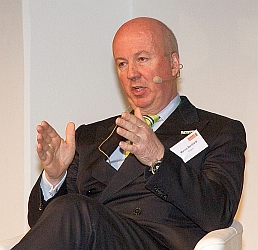 |
|
| Marcus Bernhardt already works with sharing models. |
And stitched therein is the next argument or problem that the hotel industry must drag along throughout all changes: Staff members and their training. "In the hotel industry, those who have the most guest contact are the most poorly paid," Nussbaum threw in heretically. The EHL boss remarked that new developments within the training have been sleepy over recent years and used the opportunity to announce an educational relaunch at the well-known hotel school.
Synergies from Shared Brands
The "Brand" subject was likewise in the discussion - particularly in a time in which the platforms are seizing the power for themselves. "Generation Y is showing more trust in an OTA than in a hotel brand," Nussbaum believes. "The brand alone is no longer helping us. Its meaning is decreasing. The guest is no longer served by the brand."
In a technology-driven world, survival is only possible through industry-crossing partnerships, emphasised Europcar CCO Bernhardt: "When we know that today, nearly half of all Parisians no longer own a car or a person is not only prepared to leave their apartment, but also their car, to an 'intertenant' while they are on vacation, then we should exploit this commercially." Europcar already operates a consortium with CarSharing suppliers and at the same time, is developing combined solutions for the business and private vehicle sharing market.
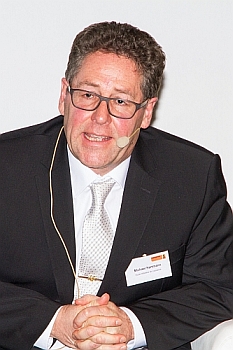 |
|
| Michael Hartmann, EHL: We need service samurais. |
New brands are thereby defined, confirmed DICON Managing Director, Wissmath. The partnerships that have already emerged between the Shared Brands and traditional travel brands are expected to increase rapidly. Expedia has already embedded Airbnb content within its range of products. Internet giants such as Amazon, Facebook, Google or eBay are already at the starting blocks for this path. In addition to consortia, there would be the possibility of bringing their own Shared Brands to life. Nevertheless, the overall development clearly indicates: Shared is more than just a hype – suppliers and products have come to stay. An absolutely new "Mind and Tool Set" is expected from the industry.
Disputed role of the community
The Sharing Economy is not conceivable without the assessment portals, explained Presenter Hans-Juergen Klesse, Reporter for "Wirtschaftswoche" magazine. As with Airbnb (where guests assess hosts and vice versa), mutual assessment systems will be everywhere. Nussbaum is convinced of the fact that the influence of the different communities is becoming increasingly stronger: "I believe in my community and the authenticity of the reviews."
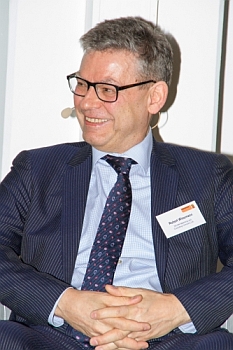 |
|
| Robert Wissmath: Assessing hosts and guests is questionable. |
A development that is very questionable to Wissmath because "To us, the system obliges people to make assessments for this purpose. Thus, the consumer becomes the active creator of the value-added chain. Only: The design and the contact with it must be still learnt." An additional challenge that walks along with the Sharing Economy is the price finding. "On the Internet and in the booking platforms, the price, price, price is always gone on about," criticised Nussbaum.
For Wissmath, the price is the most complicated point and cannot be solved with the cheap-is-best argument. He named new commercial models and innovations. The prizeotel boss forecasted an absolutely data-driven journey that has only just initiated its beginning and will provide us all with yet another giant headache …
All of the participants were able to identify with a thought that was expressed by Michael Hartmann during the conclusion of the discussion: The hotel industry is a social and cultural product and it should remain as such. / Romana Kanzian
You will find the YouTube video about this panel in full length under this direct link or at www.itb-convention.com !
Continuative Links:
- March 27, 2015 Continual re-inventions-10th ITB Hospitality Day: Lifestyle communication with budget and luxury
- March 27, 2015 Digitised and still human-10th ITB Hospitality Day 2015: IT and emotions create new hotel concepts
- March 20, 2015 The dark side of hotel distribution-ITB Hospitality Day 2015: Only a minority believes in own distribution power
- March 13, 2015 Good base for hackers-ITB Hospitality Day 2015 revealed how to crack codes and webcams
To print this article you have to be registered and logged in for newsletter, visitor or subscription.





